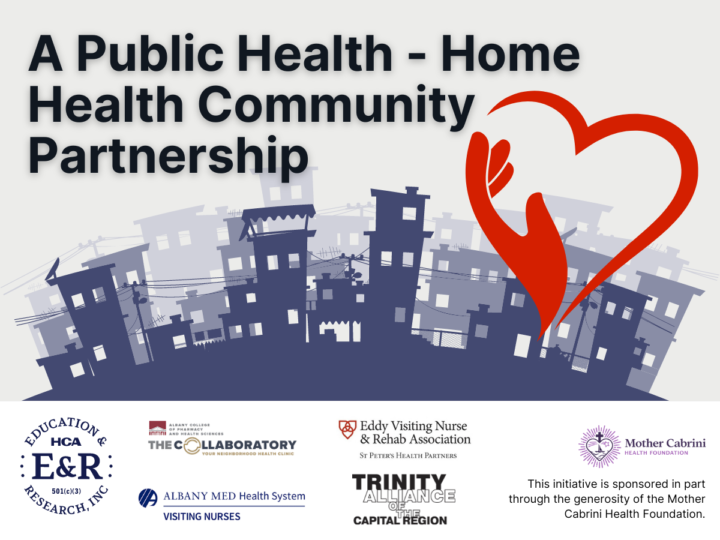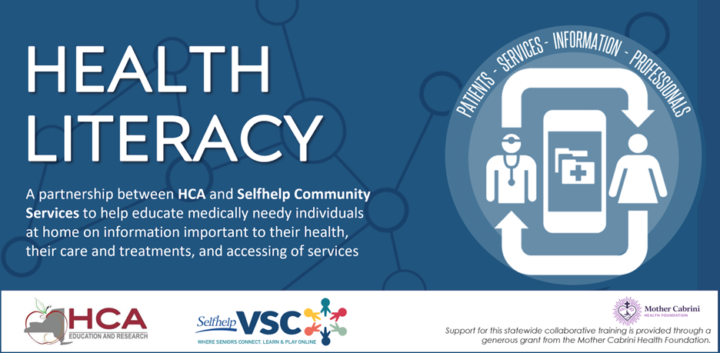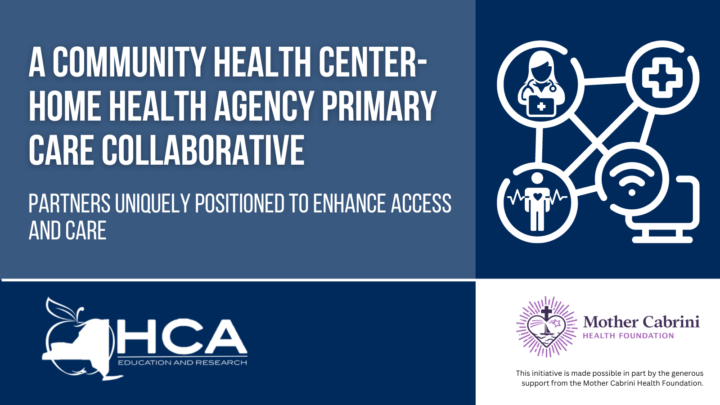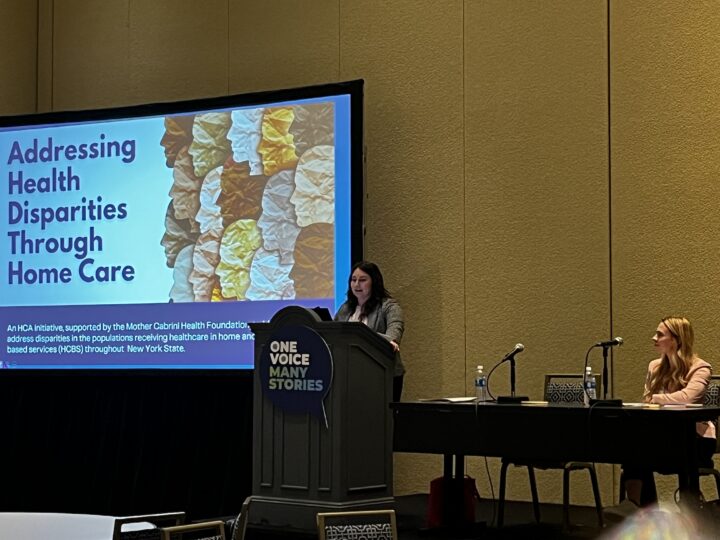ABOUT
The Home Care Association of New York State Education & Research (HCA E&R) has been awarded funding from the Mother Cabrini Health Foundation to identify and address health disparities in populations receiving health care in homes and community-based services (HCBS) statewide.
This project includes a spectrum of components, including an assessment of disparities and potential interventions, a statewide diversity and cultural awareness education for all community based care organizations’ staff, a point of service translation pilot, a live-recorded training component for strategies and support for patients who have co-occurring behavioral health and physical health needs, a health literacy component for homebound individuals, a rural primary care collaborative, and engagement in Duke University’s “Population Care Coordinator Program” to train and certify clinicians in population care coordination.
Read more about each component and how you can get involved, below.
 HCA E&R is implementing an initiative that brings together the Albany College of Pharmacy Collaboratory and home health agencies in the capital region. The Collaboratory is a community-based, charitable organization for poor, elderly, and underserved individuals in Albany’s South End. The health needs of those served by the Collaboratory align closely with the mission of home health. The collaborative pilot will facilitate direct public health services and interventions to address disparities in an underserved, high-risk community.
HCA E&R is implementing an initiative that brings together the Albany College of Pharmacy Collaboratory and home health agencies in the capital region. The Collaboratory is a community-based, charitable organization for poor, elderly, and underserved individuals in Albany’s South End. The health needs of those served by the Collaboratory align closely with the mission of home health. The collaborative pilot will facilitate direct public health services and interventions to address disparities in an underserved, high-risk community.

HCA Launches Statewide Health Literacy Initiative for Patients
The initiative will pilot test the efficacy of providing virtual health literacy education and information to home care and hospice care recipients through the Virtual Senior Center (VSC), in partnership with HCA member Selfhelp Community Services, operator of the VSC. All home care, hospice, MLTC, FI/CDPAP and Waiver Program recipients encouraged to participate.
Health literacy has been defined as “the degree to which individuals have the capacity to obtain, process, and understand basic health information and services needed to make appropriate health decisions.” (Ratzan and Parker, 2000)
Health literacy is key to positive patient experience, outcomes, effective self-care, and partnership with care professionals. It is also critical in breaking through health disparities.
With state and national policy and program prioritization on better addressing health disparities, including the state’s current work to secure a multi-billion dollar federal investment in NY to address disparities, your participation in this type of initiative will help equip you and your organization for advancement, and most importantly, will support your efforts to promote quality care and patient quality of experience, quality of life, independence and dignity.
Watch this compelling example of a VSC participant:
How to Enroll
This service will be provided without charge.
The VSC will make accessible a menu of informational and educational material to support health literacy for recipients that can be directly accessed by the individual once they are enrolled. Individuals you identify, and who wish to enroll, will just need your help to be signed into the VSC.
Once enrolled, the individual (solo or with the assistance of their caregiver or family members) can access the elements of health literacy on the VSC. There is no limit to access; recipients can sign-in according to a schedule that works best for them.
There are no requirements other than to enroll, and to agree to provide feedback on the experience and benefit. Participating providers and organizations will be similarly asked to provide feedback and recommendations that HCA and the Mother Cabrini Foundation can use to evaluate and consider long-term support for the program.
At this link, you can enroll your client immediately by creating an account for them. The VSC team will keep HCA apprised (de-identified, no PHI) of the number of enrollees by organization and region.
HCA E&R in conjunction with our project partner, IPRO, led a statewide assessment to explore disparities and interventions that assist with impacting care in HCBS. Read the full report on identified health disparities, corresponding gaps and barriers, and potential interventions here.
As a result of the assessment, respondents requested more information in in various areas. The following webinars were made available to fill the gaps identified from the assessment. The recordings are available on HCA’s LMS via the links below.
Assessing and Addressing Social Determinants of Health by Adopting and Utilizing PREPARE
This presentation provides an overview of the PRAPARE (Protocol for Responding to & Assessing Patients’ Assets, Risks & Experience) screening tool, implementation and action toolkit, available resources, and reviews PRAPARE codes including ICD- 10 CMS Z codes and others. Handouts are available here.
Collaborating and Knowing Your Community Partners and Resources
This presentation shares insights on successful partnerships, tips for navigating the challenges of creating new relationships, and reviews a Socioeconomic Risk Assessment tool, and a Community Resource Tool which includes county-level resources. Access the tool here.
Best Practices for Collecting and Utilizing Patient Sociodemographic Data
This presentation reviews best practices for collecting and utilizing patient sociodemographic data used to identify and address disparities to ensure equitable care, and the impact of health-related social needs on health outcomes.
This presentation will provide an overview of the Centers for Medicare & Medicaid Services (CMS) Accountable Health Communities Model (AHC) and Health-Related Social Needs (HRSN) Screening Tool. This presentation will also highlight AHC’s best practices and outcomes though case studies, EHR integration and ICD-10 CMS Z codes. Access the handouts here.
HCA, in partnership with the New York State Office of Mental Health and the Finger Lakes Geriatric Center of the University of Rochester, has special training available for staff of home care agencies, hospice, MLTC and community mental health provider staff to advance the skills and knowledge of staff and the agencies’ organizational practices and strategies for the care and support of patients who have mental health interdisciplinary needs.
Recordings are now available for this specially-developed curriculum to enhance your practice knowledge and skills in the care of individuals with co-occurring physical and mental/behavioral needs; these are the individuals with the most complex, intensive and interdisciplinary needs; those who represent the greatest challenges in care; and those who far too often suffer the cracks of the fragmented physical-and-mental/behavioral health system.
Introduction to Mental Health and Accessing Services: November 30, 2022 Recording Available
- The 3 D’s: Dementia, Delirium & Depression Tom Caprio (40 min)
- Accessing Mental Health Services for Additional Support – Dr. Flavio Casay (40 min)
Understanding Health and Mental Health: December 14, 2022 Recording Available
- Overview of Serious Mental Illness (SMI) – Gregory Sherman, MD
- Psychotropic Medications – Jane Sundberg, PharmD
Improving Communication and Addressing Crisis): January 18, 2023 Recording Available
- Communication Approaches for Clients with SMI – Carol Podgorski, PhD, MPH, MS
- Crisis Intervention – EJ Santos, MD, MPH
A Point-of-Care Tool for Direct Care Providers
HCA E&R in partnership with the Finger Lakes Geriatric Education Center held an educational webinar on December 15th to provide an overview of Dementia, Delirium, and Depression, and introduced a new point-of-care tool to help direct care providers better understand the differences between the 3 D’s while providing care to populations in the home and community setting.
Dr. Thomas Caprio, MD, Professor of Medicine, and Director of the Finger Lakes Geriatric Education Center provided the overview of the new tool, supplemental information, and a Q&A session. You can view the webinar here.
The tool is available via sign-up. It is available as a one-pager PDF as well as a mobile phone friendly version. Sign up through the form below and HCA E&R will send you the tools for use.
Delirium, Dementia, and Depression Tool
HCA E&R in partnership with Nascentia Health and five pilot agencies conducted a point-of-care translation service for English language-challenged and non-English speaking individuals in home care. In addition to supporting the care of these individuals, the program informs potential statewide replication goals.
Through this initiative, HCA E&R and Nascentia Health worked with LanguageLine Solutions to translate a number of resources in multiple languages prevalent in NYS. Among the resources are tools for providers and patients including sepsis zone tools (adult, pediatric, maternal), a general health booklet, a call for help tool, heart failure symptom tracker, COPD action plan, and a respiratory zone tool.
Complete the form below to access the tools.
Translation Services
HCA has engaged Duke University’s “Population Care Coordinator Program” to train and certify clinicians in population care coordination focused at the community, organizational and patient level. This initiative is currently piloted in 10 agencies across NYS serving as the basis for evaluation and potential expansion for broader availability.
Twenty two clinicians across NYS were engaged and certified upon completion of this training program.

Our latest project is the Rural Primary Care Collaborative. It is a rural primary care program, under an FQHC-Home Health Agency collaborative, providing primary care access and intervention for individuals who do not, or have difficulty, accessing primary care in a clinic or other office-based environment.

HCA’s Taylor Perre (Senior Associate for Public Health and Policy), Kaylee White (Associate for Public Health and Policy), and Celisia Street (Vice President of Workforce Development and Innovation) attended the National Association for Home Care and Hospice (NAHC) Conference and Expo last week.
HCA was honored to be accepted to present highlights of two of our grant-sponsored initiatives at the conference this year. Taylor and Kaylee hosted sessions on Addressing Health Disparities Through Home Care, and Collaborative Models of Community Medicine and Paramedicine, two initiatives generously funded through grants from the Mother Cabrini Health Foundation. These presentations provided an avenue for connections, information sharing and dialogue with home health and hospice professionals from across the country to discuss related experiences, offer insights and inspire innovation.
HCA staff engaged in many educational sessions on a range of topics, bringing back ideas and new models and initiatives to share with our members. Session topics included but were not limited to, NAHC advocacy efforts, using AI to identify potential workplace violence risk, preventing emergency department visits by understanding PCP relationships and home health opportunities, journey to a new home health delivery model, protecting home care workers from workplace violence, and many others.
NAHC leadership unveiled the first wave of their emerging public image campaign designed to highlight the value of care in the home nationwide. HCA is eager to work with NAHC and our peer organizations across the country to advance this mission critical goal.
Throughout the event, HCA visited with many industry leaders, partners, and new vendors to discuss helpful strategies, emerging technology and stay up to date with what’s happening in the world of home care and beyond.
We are excited to learn from industry leaders and plan to share with you through our upcoming member engagement events all of our takeaways for how to keep advocating, innovating, collaborating, and supporting the home care, hospice, MLTC, PACE, FI & CDPAP, industries.




